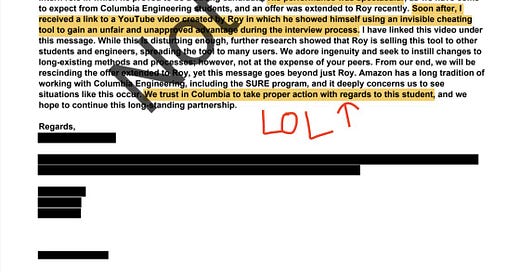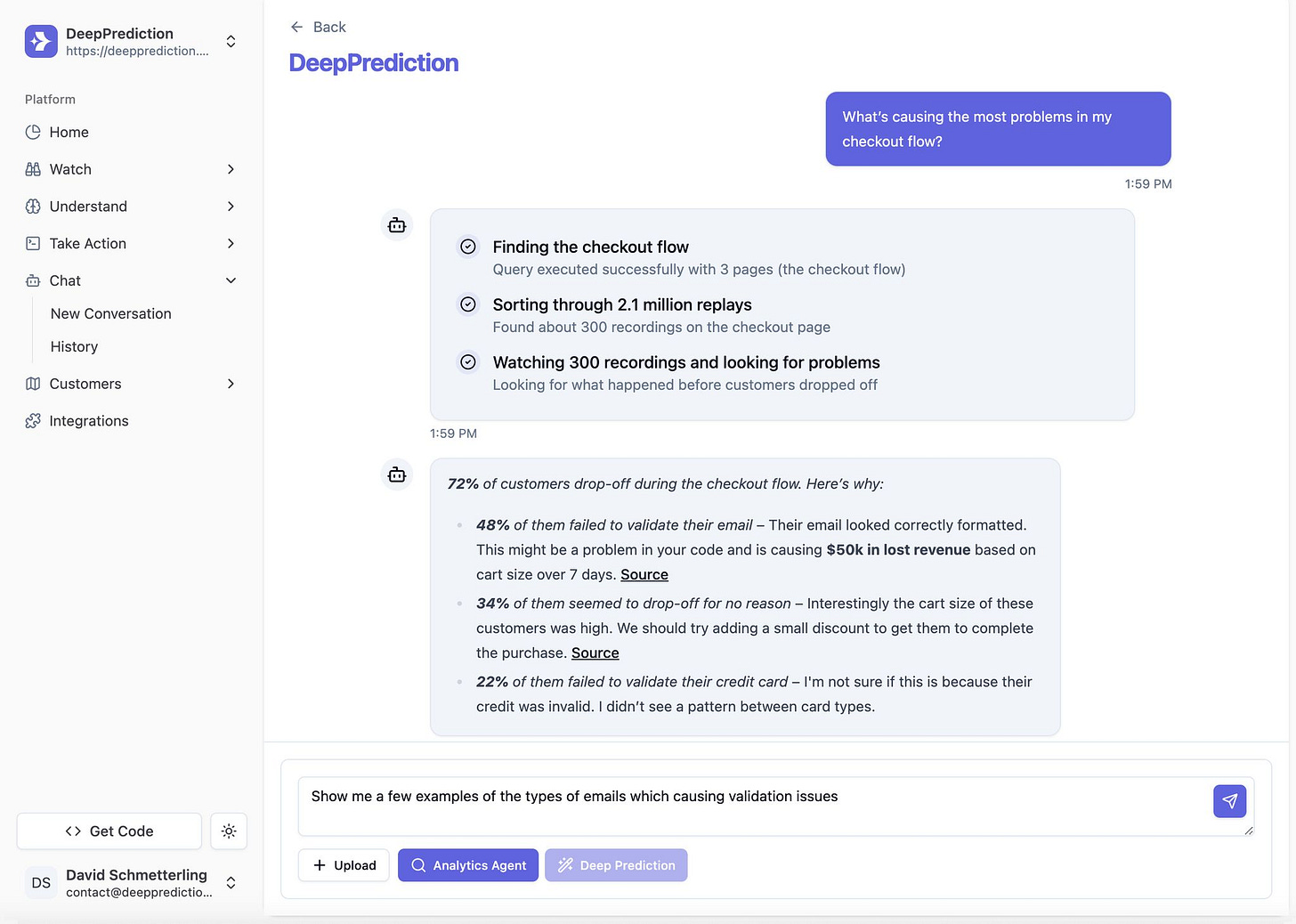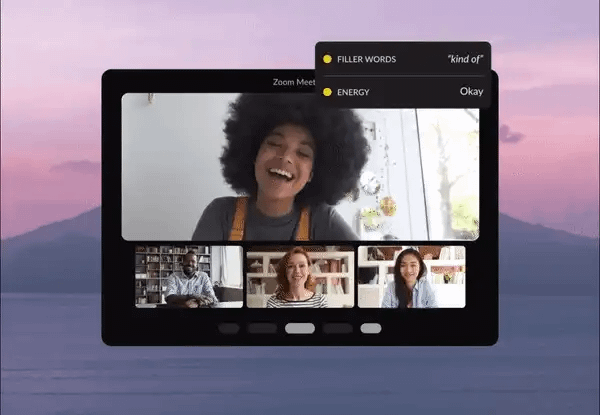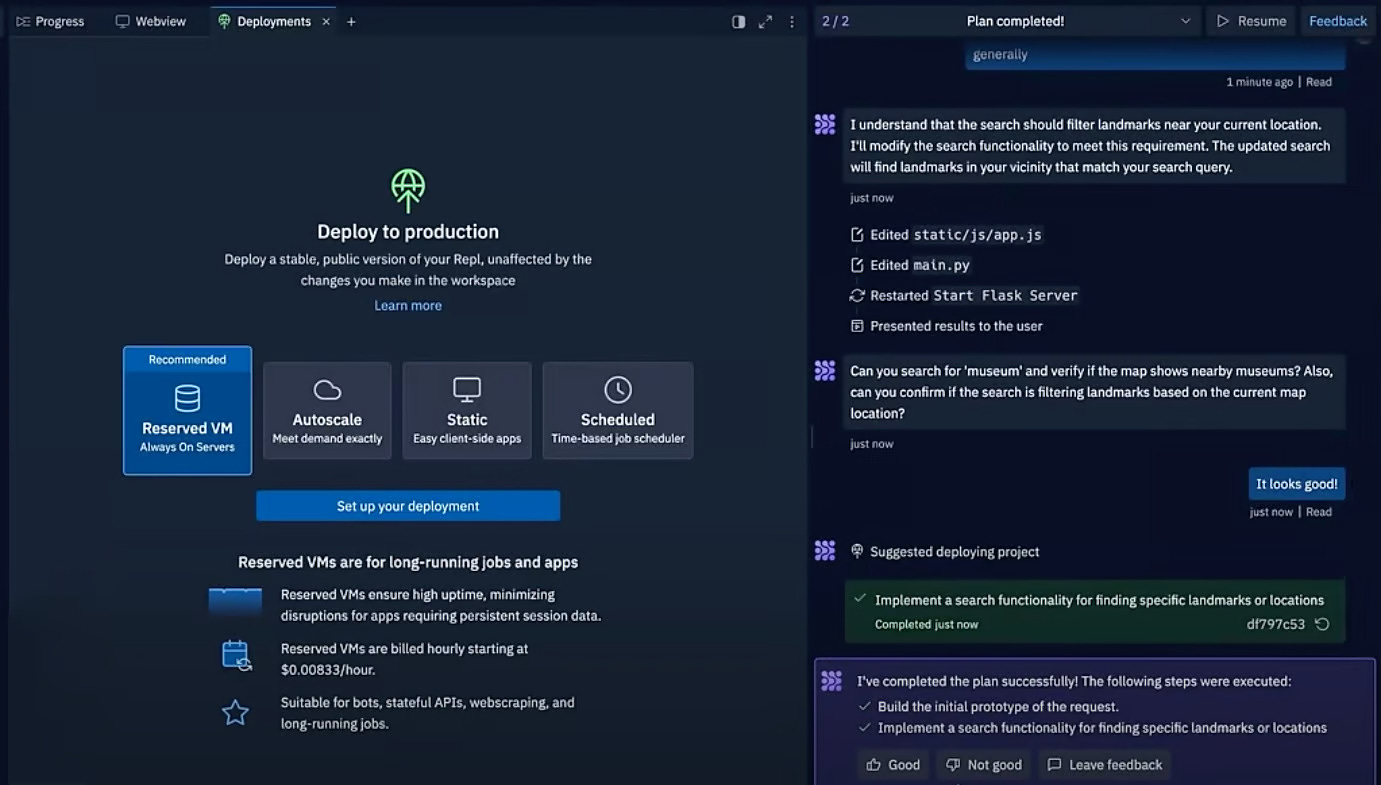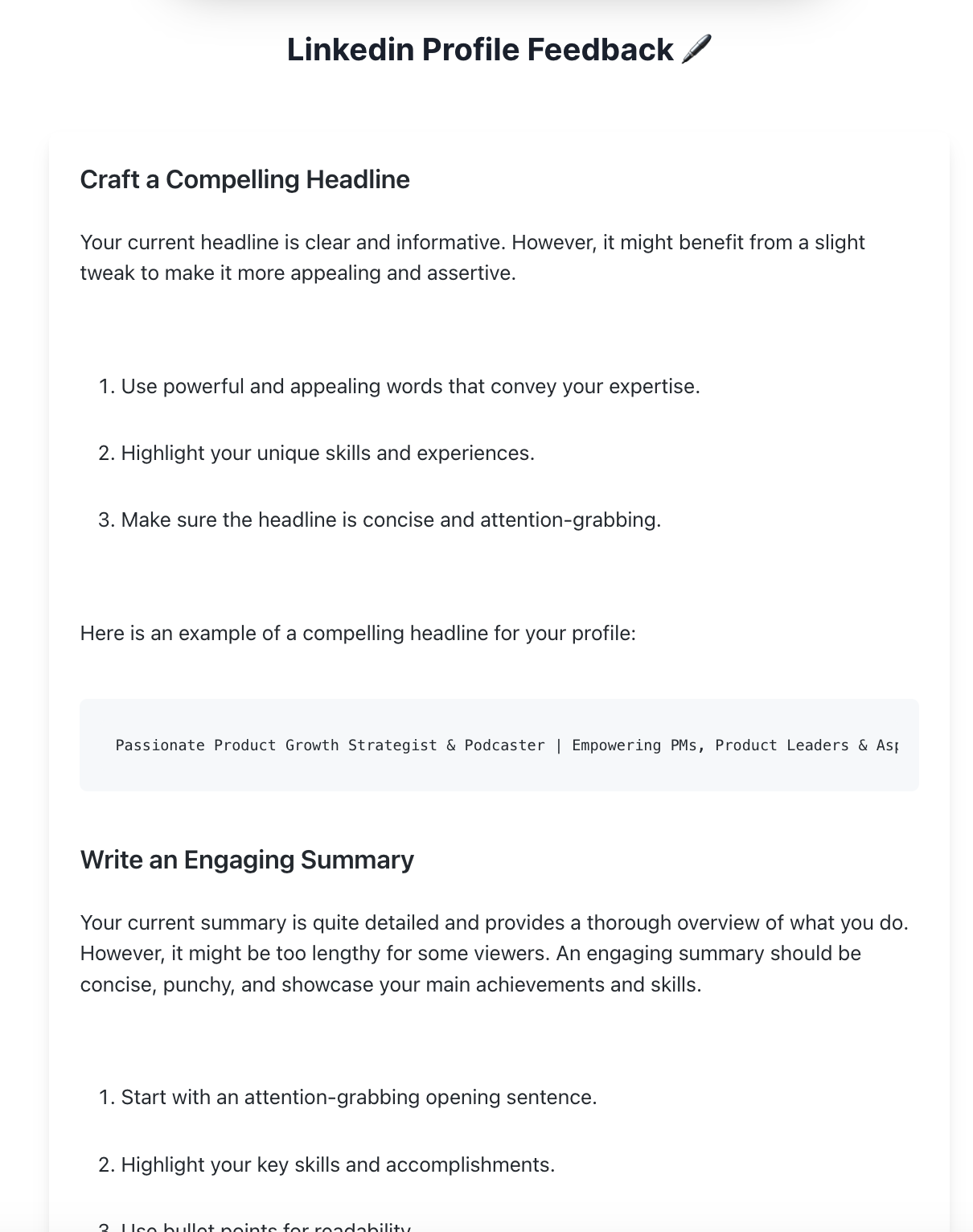The AI Job Search Tool Market: Everything You Need to Know
No one is talking about the plethora of new AI job search tools out there. Today, I give you a complete guide into everything out there. It's the AI tool guide you didn't know you need.
Everyone is talking about ChatGPT.
No one is talking about AI job search tools.
Did you know your interview competition is using AI copilots that automatically share answers to questions as interviewers ask them?
Of course, employers don’t always like it. It leaked this week that Amazon sent the following note to Columbia:
They did not take kindly to the use of the tool. But they couldn’t detect it.
Today, I’m not going to recommend you use such a tool - that decision is up to you - but, I am going to show you what tools exist in today’s post.
Because someone has to!
Today’s post is completely free thanks to DeepPrediction
AI-Powered Analytics to Build What Matters. Analytics for the ChatGPT era.
Product managers shouldn’t have to guess what users need. DeepPrediction uses vision-first AI to watch real user behavior in your product, understand what they actually do (not just what they say), and even take action autonomously.
Reveal conversion issues: Automatically identify UX and conversion issues, even auto-creating Jira tickets with fixes.
Resolve support and bug issues fast: Pinpoint root causes instantly, slashing resolution times.
Stop fraud instantly: Detect and ban suspicious behavior on autopilot.
Empower your team: Give every employee an AI analyst with zero setup.
Focus on what truly matters. Get Early Access Now and become the 10x Product Manager your team needs.
Landscape of Tools across the lifecycle
There are tools for each and every step of the journey: getting interviews, creating standout materials, and acing interviews:
Interview co-pilots are just the tip of the iceberg.
Today’s Deep Dive
I’ve spent the last 3 weeks trying all 63 of the biggest AI job searching tools to separate the fluff from the chuff. Today’s post is everything you need to know:
Overview of all 63 tools
Tiering of my favorite tools
Deep walkthrough of how to use the top 10 tools
1. Overview of All 63 Tools
So you’ve seen the tools, but what do they actually do? I tried every single one of these tools so you don’t have to.
Here’s what they actually do (not just what they say on the marketing site).
Step 1 - Getting Interviews
AI Job Discovery
Tools that help you find jobs you are qualified for:
Simplify: Has three main features:
1. Shows you jobs you are a match for
2. Automates job applications with AI autofill via its Chrome extension
3. Provides guidance on tailoring your resume
TheJobForMe: Matches users with personalized job opportunities based on your resume or LinkedIn
Talentprise: AI-driven recruitment platform matching job seekers with employers
EarnBetter: It crafts a new version of your resume, and helps with personalized messages and job searches
RefereeAI: Searches company job boards for postings
Writing Cold Messages
Tools that draft your outreach for you:
Apollo.io: Provides you with emails and phone numbers, plus AI to help write the messages
Lavender: This chrome extension gives you feedback on cold messages as you write them
JobWizard: Chrome extension for drafting cold messages, customizing resumes, and autofilling forms
Rytr: AI writing assistant that you can use for cold outreach messages
CareerFlow.Ai: Collection of AI tools in its app and chrome extension that cover everything from resume optimization to cover letters, LinkedIn headlines, and cold e-mails
ChatGPT: It’s an all-purpose LLM, but it especially excels at generating personalized cold outreach messages with the right prompt
Automatic Applications
Tools that submit applications for you:
Massive: Automatically applies to relevant jobs for you for $39 or $99/month (to get custom resumes and cover letters)
Sonara.ai: It will mass apply with your generic resume to 100s or 1000s of roles for $2.95/mo
LoopCV: Uploads your resume and applies to multiple jobs with one click
JobCopilot: Charges 8.90 per week to automatically apply to jobs you’re qualified for with AI CVs, cover letters, and job matches
AutoApply: Targets and submits applications to roles matching your profile
JobSeer: Matches your resume to job listings and assists with applications
LazyApply: Automates applications across platforms like LinkedIn and Indeed
Customizing Resume
Tools that optimize your resume for specific job postings:
Jobscan: Analyzes resumes against job descriptions for ATS compatibility
Teal: AI-powered resume builder with keyword suggestions and ATS optimization
Resume Worded: Provides feedback to optimize resumes and LinkedIn profiles
Rezi.ai: Focuses on keyword matching and formatting for ATS systems
SkillSyncer: Scans your resume and offers AI auto-enhance to match with job descriptions
Kickresume: Creates customizable resumes with templates and content suggestions
Enhancv: Provides tailored suggestions to align with job requirements
VMock: Offers real-time feedback based on industry standards
CakeResume: Resume builder with templates and customization options
Wozber: Tailors resumes for ATS compatibility and keyword integration
ResumAI: Optimizes resumes to match job descriptions and pass ATS filters
Huntr: Job search organizer with features to customize resumes and track applications
Step 2 - Creating Standout Materials
Creating Work Products
Tools that help you stand out with a work product:
Figma with AI Plugins: Creates mockups and visual work products with plugins like Magician
Claude: Generates high-quality text for work samples and creative projects
Replit: Collaborative coding platform with AI assistance via Ghostwriter
Notion AI: Generates content and organizes portfolios
Loom AI: Enhances video recordings with auto-editing and summaries
Quickbase: Low-code platform to build custom apps or workflows
Bolt: Rapid prototyping for interactive web-based work products
Canva AI: Generates designs and visual portfolios via Magic Studio
Grok: Generates text-based work products like cover letters and proposals
Building an Inbound Engine
Tools that help build your professional presence online:
LinkedIn AI Features: Profile optimization and job recommendations
Buffer: Schedules and optimizes social media posts
Jasper: Creates blog posts and content to establish your online brand
Taplio: Optimizes LinkedIn content to attract recruiter attention
HeyGen: Generates AI-powered videos for personal branding
Aragon.ai: Creates professional AI-generated headshots
SectaLabs: Produces high-quality headshots for professional branding
ProfilePicture.ai: Generates custom AI headshots for professional images
Step 3 - Acing Interviews
Interview Prep Tools
Tools that help you prepare for interviews:
Google's Interview Warmup: Provides practice questions and feedback
WonsultingAI: Offers resume building, cover letters, and interview prep
Interviewsby.ai: Generates personalized questions with AI feedback
Interviewai.io: Creates job-specific questions and mock interviews
Huru: Generates interview questions with feedback on responses
Big Interview: Combines AI practice with video lessons
AI Interview Simulators
Tools that help you practice with simulations:
Yoodli: AI speech coach that simulates interviews with feedback
Final Round AI: Mock interviews with real-time feedback and suggestions
Interviews.chat: AI-driven mock interviews tailored to job descriptions
AIApply Interview Buddy: Simulates interviews with improvement tips
Mockmate: Analyzes responses for better performance
Pramp: Pairs users for peer practice with AI features for technical interviews
AI Interview Co-Pilots
Tools that help you succeed during the interview:
Poised: Provides real-time feedback on speech and presentation
InterviewGPT: Assists with AI-generated responses and tips
Interview Hero: Offers real-time support and question prediction
InterviewCoder.co: Provides assistance for coding interviews
There would normally be a paywall here, but there isn’t thanks to DeepPrediction
Created by friend of the newsletter, former Google PM, and former guest author Liam Bolling, DeepPrediction just launched this week.
It uses AI to watch your users - so you can go beyond the analytics.
2. Tiering of My Favorite Tools
After trying all the tools, I’ve gone ahead and put them into a classic tier-listing:
Here’s why the tools received those ratings.
S-Tier Products
Claude - It's an all-purpose beast that should be your job searching AI co-pilot for all purposes
ChatGPT - It's not quite as good as Claude, but it's close; and when you hit those usage limits on Claude, it's a good second option
A-Tier Products
InterviewCoder - Real-time coding help during interviews that employers can't detect. Essentially cheating, but effective. Whispers solutions when you're stuck and predicts questions in advance. Ethically dubious but technically impressive.
SectaLabs - AI headshots that actually look professional, not the uncanny valley nightmare from other tools. Worth it if your LinkedIn photo is a cropped vacation pic or awkward selfie. Expensive but cheaper than a photographer.
Teal - Resume optimization that goes beyond keyword stuffing. Its ATS score feature actually shows you what's working and what isn't. Free plan is surprisingly useful, but expect upsell attempts for the premium features
Grok - It's rapidly improving and becoming a serious competitor to ChatGPT and Claude. While not specifically designed for job searching, its conversational approach and creativity make it excellent for generating innovative answers to behavioral questions and crafting compelling cover letters with personality.
Simplify - Chrome extension that actually finds relevant jobs instead of random matches. Autofill feature saves hours of tedious form-filling. Job matching algorithm occasionally misses the mark, but better than most competitors.
Replit - Coding platform with AI assistance that helps build portfolio projects employers actually care about. Ghostwriter feature isn't perfect but saves time on boilerplate code. Good for creating demonstrable skills beyond your resume.
Canva AI - Makes non-designers look competent with minimal effort. Magic Studio creates decent visuals without the learning curve of professional tools. Templates can look generic if you don't customize enough.
Final Round AI - Mock interviews that feel surprisingly real. Adapts follow-up questions based on your responses like a real interviewer. Feedback is useful but sometimes too generic for specialized roles.
Poised - Your secret interview coach. Subtly flags when you're rambling or using filler words during actual interviews. Sometimes distracting with pop-up notifications at the wrong moment.
Taplio - LinkedIn optimization tool that’s quite good at what it does, and has AI built in though that’s not always the best part
B-Tier Products
Apollo.io - The AI writer isn't built for job searching, but it's a great place for e-mails to actually reach people
JobWizard - It's Autofill works really well to speed up applications, and it's cover letters aren't half bad either for AI
Massive - It can auto-apply to jobs for you with a good level of control about which jobs, and has the ability to even pay for custom resumes and cover letters, but it's expensive and questionable you even want an auto-applier. There are also beaucoup complaints about its email system
Figma with AI Plugins - Essential for design roles, overkill for everything else. Magician plugin generates decent starting points but requires refinement. Learning curve is steeper than advertised.
LinkedIn AI Features - Built-in tools that are surprisingly useful. Profile suggestions sometimes generic but job matching has improved. Since recruiters live here, even small optimizations help.
Rezi.ai - Hyper-focused on ATS compatibility to the exclusion of readability. Good for getting past initial screens but resumes can feel robotic. Templates are solid but unimaginative.
Google's Interview Warmup - Free tool with decent question bank. Analysis is basic but helpful for identifying verbal tics. No video capabilities limits its usefulness for delivery practice.
Aragon.ai - Budget version of SectaLabs. Headshots occasionally look AI-generated but still better than most selfies. Fewer style options but gets the job done.
WonsultingAI - Specialized for government and corporate applications. Great for keyword optimization in rigid hiring systems. Interface feels dated but functionality works.
InterviewGPT - Structures interview answers using proven frameworks like STAR. Responses need editing but provide solid starting points. Question predictions sometimes miss specialized topics.
DeepSeek - Powerful AI with strong technical capabilities. Security concerns from Chinese ownership limit its appeal. Excels at coding problems but writing can feel stilted.
C-Tier Products
Lavender.Ai - It gives you pretty good feedback, and I like the ChatGPT integration in emails, but some of its suggestions just seem rule-based and it doesn't edit for you so the AI itself is kind of weak
Sonara.Ai - It does its job of automatically applying for you, but it's job matching isn't very good, and it uses your generic resume, so it's not that helpful overall. It has been bought out and the service degraded
Gemini - For a Google LLM, which has some of the world's most expensive researchers behind it, you'd expect it to be so much better. But it's just not there yet
JobCopilot - Unlike most copilots, it finds roles that actually make sense, but there's no free plan and the AI hallucinates all sorts of fabrications. Reviews online aren't great
CareerFlow.Ai - The free plan is limited to a resume builder that made my resume significantly worse, and other functionality is limited to plans starting at $8.99 per week (steep when you can do better with Claude for almost 1/2 the price) but at least everything works and is modern
Kickresume - Templates look decent but AI content suggestions are generic. Better than writing from scratch but only barely.
Enhancv - Resume builder with basic AI suggestions. Pretty templates but the "optimization" is just keyword insertion.
CakeResume - Asian-focused resume builder with limited AI capabilities. Templates are unique but not always professional-looking.
Quickbase - Low-code platform that's overkill for most job seekers. High learning curve for minimal payoff.
Huru - Generates interview questions with shallow feedback. Feels like an early AI prototype rather than a polished product.
Big Interview - Combines basic AI practice with pre-recorded video lessons. Content is solid but technology feels dated.
Yoodli - AI speech coach with limited interview-specific features. Good for presentation practice but not specialized enough.
Interview Hero - Real-time support that often misunderstands technical questions. Suggestions can be misleading in specialized fields.
Gemini - For Google's flagship AI, it's disappointing. Hallucinations are common and interview advice is generic. Stick with Claude or ChatGPT.
D-Tier Products
SkillSyncer - I felt it was a hastily put together product that mainly keyword stuffed. I don't think it will help humans with the resume. It might help other AIs
TalentPrise - They have an extremely lengthy questionnaire that feels out of 1990, and the jobs they suggested were terrible fits
Rytr - There's no integrations and it's not purpose-built for job searching, but it will give you some AI writing tips that are okay
EarnBetter - It returned back a worse version of my resume, and the job search results were not even PM jobs
RefereeAI - It returned just 2 product manager jobs in my area, both which are at risk of being inactive
CopySmith - Content generator with stiff, formal language that screams "AI-written." Poor templates for professional documents.
TestIO - Supposedly helps with technical assessments but provides surface-level solutions that don't demonstrate understanding.
LoopCV - Promising features that simply don't work. Returns zero results for common roles. Stuck in 2022.
AutoApply - Mass application tool with poor targeting. Expect rejection emails if you get responses at all.
JobSeer - Chrome extension that frequently crashes. When it works, matches are questionable at best.
VMock - Outdated interface with simplistic resume feedback based on rigid rules rather than context.
Wozber - ATS optimization that focuses on keyword density over readability. Resume becomes keyword soup.
ResumAI - Aggressively upsells premium features while free version offers minimal value. Basic keyword matching and nothing more.
Huntr - Job search organizer with clunky AI features tacked on. The tracking board is useful but AI is an afterthought.
Loom AI - Video enhancement that's rarely relevant for job seekers. Features don't justify the subscription cost.
Buffer - Social scheduling tool with basic AI suggestions. Not specialized for professional branding.
Jasper - Content generator that's decent for marketing but poor for job materials. Tone is rarely appropriate for professional documents.
HeyGen - Video generator with robotic delivery and unnatural movements. Uncanny valley effect hurts more than helps.
ProfilePicture.ai - Budget AI headshot tool that produces obvious AI images. Recruiters can tell they're fake.
Interviewsby.ai - Generates generic questions without industry context. Feedback lacks actionable insights.
Interviewai.io - Technical issues prevent completing most mock interviews. When it works, questions are surface-level.
Interviews.chat - Clunky interface with slow response times. Questions don't adapt to your answers like promised.
AIApply Interview Buddy - Provides generic advice during interviews that's more distracting than helpful. Notifications pop up at worst times.
Mockmate - Outdated question bank and primitive analysis of responses. Save your money.
Pramp - Peer practice platform where AI features feel bolted on. The human practice is valuable but AI adds little.
F-Tier Products
The JobForMe - There were multiple problems with the website and it didn't return jobs for me
LoopCV - The features seemed promising, however it wouldn't return any job search results for me (even remote PM jobs) and the long forms weren't AI-enabled. It seemed like a product out of 2022
3. Walkthrough of The Top 10 Tools
Let’s go deep on the top 10 tools, from my favorite to least:
These are one’s you should consider using.
Tool 1 - How to Use Claude for Job Searching
Claude is INCREDIBLE. Seriously, it's the single most powerful job search tool I've tested, and nothing else comes close. The quality gap between Claude and dedicated job platforms is embarrassing for the specialized tools.
Here's where Claude absolutely crushes it for job seekers:
Resume targeting - It analyzes job posts with uncanny precision, identifying key requirements and suggesting specific modifications to your experience bullets that maintain integrity while highlighting relevant skills.
Cold outreach creation - For a target company, it drafts cold emails that sound genuinely human, incorporating company-specific language and crafting a narrative about why your experience would benefit them.
Referral message generation - It can analyze your LinkedIn connections, identify potential referral paths into target companies, and draft messages personal enough to get responses. One subscriber got three referrals in a week after months of failed attempts.
Work product improvement - It helps structure impressive deliverables by outlining case studies, structuring analysis, and polishing written communication. Its suggestions on clarifying requirements and highlighting business impact elevate the final product.
Most job seekers waste Claude on generic cover letters. Use it for deep customization instead. I literally can't recommend this tool enough.
Here I am getting help to customize a resume, and the customization would cut down my time from 30 minutes to like 5 minutes:
Tool 2 - How to Use ChatGPT for Job Searching
When Claude hits its usage limits (which happens frequently), ChatGPT is a solid backup with some standout capabilities.
For job searchers, ChatGPT excels at:
Company research before interviews
Crafting personalized cold outreach
Identifying "bridge roles" for career transitions
Preparing structured STAR-method answers for behavioral questions
Finding "hidden jobs" by analyzing company news
Creating networking messages that feel authentic
Decoding rejection email patterns
I've seen subscribers get 40-50% response rates using ChatGPT to craft cold emails with proper customization.
One strategy that works brilliantly: use it to identify roles that can help you transition to your target position. If you're struggling to break into product management, have ChatGPT analyze your background and map specific stepping stones that are more attainable than making a dramatic leap.
Here’s an example of it vastly accelerating company product resarch before an interview (using Deep Research):
Tool 3 - How to Use Poised for Job Searching
Real-time feedback during actual interviews is Poised's killer feature. While other tools focus on practice, Poised works during the real thing.
What Poised monitors and helps improve:
Speaking pace
Filler word frequency
Eye contact with the camera
Energy level and enthusiasm
Talk-to-listen ratio
Interruption patterns
Overall engagement
I used it during test calls and mock interviews. Its nudges were timely without being distracting. You can customize the volume and frequency of alerts.
What impressed me most was how it didn't just flag issues but offered quick suggestions for correction. When I was speaking too quickly, it suggested "Take a breath between main points."
The post-interview analytics show your improvement over time, which is satisfying to watch as you practice.
Tool 4 - How to Use SectaLabs for Job Searching
Professional headshots matter more than people admit.
You need a good LinkedIn profile to win at job searching. And a headshot is one part of the picture.
After testing many AI headshot generators, SectaLabs was the only one where the images didn't immediately look AI-generated.
I uploaded a few selfies and got back dozens of polished professional photos. The lighting is natural, the details are sharp, and they avoid that uncanny valley look of most AI portraits.
I showed the results to my photographer friend without revealing they were AI-generated. He critiqued the composition naturally before I told him the truth – with other tools, he spotted the AI origin immediately.
For $29, you get dozens of variations, far cheaper than a professional photoshoot at $200+. The time savings alone is worth it.
My profile photo is from Secta:
Only use the professional and casual business styles. The "creative" filters with unusual lighting or backgrounds always look fake.
Tool 5 - Replit
For my money, Replit has the best AI agent. Period.
So, Replit is the AI prototyping tool that makes my top 10.
Replit transforms "show, don't tell" from career advice cliché into something actually doable. I've reviewed enough applications to know that functional demos get callbacks that resumes alone don't.
Why you should care about Replit:
Creates impressive working prototypes quickly
Handles deployment headaches automatically
Makes sharing work with hiring managers seamless
Includes AI assistance for faster development
Showcases skills more effectively than a resume ever could
You can build fully functioning prototypes to send to people to make your cold outreach and work products really stand out from the crowd.
Tool 6 - Final Round AI
Most interview practice tools feel robotic, but Final Round AI adapts to your responses rather than following a script.
I gave intentionally vague answers during testing. Rather than moving to the next question, it pressed for specifics like real interviewers: "That's interesting, but can you walk me through the specific metrics you used?"
It adapts to your industry:
Technical interviews include appropriate coding challenges
Sales role practices focus on closing techniques
Product management simulations dig into prioritization
Data science interviews emphasize analytical methods
Leadership questions probe decision-making philosophy
The post-interview feedback identifies patterns in your responses. After five practice sessions, it noticed I consistently undersold achievements and relied too heavily on technical details rather than business impact.
The interface occasionally glitches during longer sessions, and some specialized roles don't have enough tailored questions yet.
And it isn’t just a copilot:
It’s the full suite of AI job search tools, and my highest rated pure play AI job searching tool
Tool 7 - Canva AI
Canva AI saves tremendous time on creating job search materials. Their Magic Studio transforms boring text into visually appealing documents.
I created:
Portfolio one-pagers
Custom resume designs
Presentation decks for case studies
Infographics showing accomplishments
Visual project timelines
The template selection is massive, but that's a problem – everyone uses the same popular templates. Take time to customize or create something unique, or your materials will look identical to half the applicant pool.
Use Canva for standalone documents like portfolios and presentations. For resumes, start with an ATS-friendly tool like Teal then enhance the visual design with Canva.
Tool 8 - Teal
Speaking of Teal…
After testing so many resume optimization tools, Teal was the only one that didn't make me want to give up. Most "AI resume tools" are glorified keyword stuffers.
What makes Teal stand out:
Actually restructures experiences to highlight relevant achievements
Shows what ATS systems "see" when scanning your resume
Suggests meaningful structural changes instead of just swapping synonyms
Includes a job application tracker that reminds you of follow-ups
Stores different resume versions for each application
They also have legitimate job trackers, AI interview coach, and more. It’s one of the more successful tools and they are investing.
That’s why it’s my second highest ranked pure play AI job searching tool.
Tool 9 - Simplify
Chrome extensions usually disappoint, but Simplify is... pretty good. It's not going to change your life, but it does handle basic application automation adequately.
The autofill feature correctly completed most application forms I tested, including those annoying ones that make you manually enter everything despite already uploading your resume. This saved about 3-4 minutes per application.
That’s what ranks it the third highest pure job searching AI tool.
Its job matching algorithm found a few relevant openings that were missed on major job boards, but nothing revolutionary. For a product role search, it surfaced some remote positions not immediately visible on LinkedIn or Indeed.
The extension occasionally conflicts with password managers. I had to disable LastPass on application pages to get Simplify working properly.
Don't rely solely on their job recommendations – use it as a supplement to your main search. It's a decent time-saver, but not the game-changer that top tools on this list represent.
Tool 10 - Taplio
LinkedIn optimization actually matters for PM job searches, as inbound is still the best channel.
And Taplio does it better than competitors.
While not exclusively for job searching, it significantly improves recruiter visibility.
The profile analyzer caught keyword gaps in my experience section that were causing me to miss recruiter searches. Its content scheduler can dramatically increase your profile views - for one person I coached, by 4300% in just three weeks of consistent posting.
What makes Taplio worth using:
Identifies high-value connections at target companies
Suggests optimal posting times based on your audience
Analyzes which content themes perform best
Tracks profile visibility metrics over time
Streamlines engagement with potential referrals
The AI content generator isn't spectacular, but the analytics capabilities are genuinely insightful. Skip the cheapest plan - it lacks the useful features. At $39/month for the full version, it's pricey but delivers measurable visibility increases.
You can vastly increase your profile views, which will eventually increase your inbound.
Just remember: you don’t want to be known as a content-person. You still want to be known as a PM.
Putting It All Together
Today’s post was completely free thanks to DeepPrediction
Support a fellow PM and check them out!
I cranked out an extra deep dive for you this week. Were my 5-hour sleep nights worth it?
Email productgrowthppp at gmail dot com for advertising opportunities.
Up Next
After my solo podcast episode, we have some cool episodes coming: Gayle McDowell (Author, Cracking the PM Interview), Satish Mummareddy (Former L7 PM at Meta), and Ethan Evans (Former VP at Amazon).
We also have some sick newsletter deep dives coming:
How to Choose the Right Metrics
Ultimate Guide to Product Strategy
How to Break into OpenAI
Deep dives 1 and 3 won’t be free like this, so be sure to subscribe.
(Your company will probably allow you to expense the subscription.)

